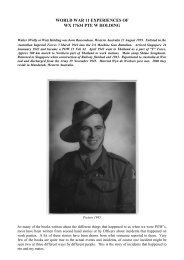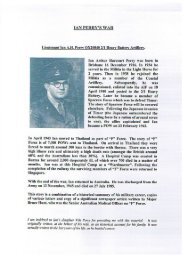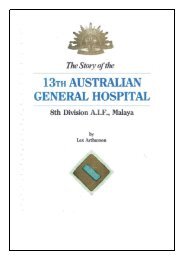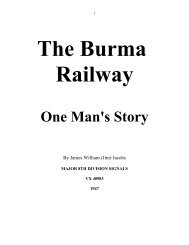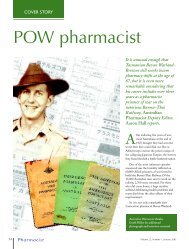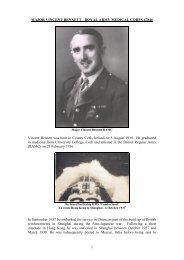Hoten pow camp, mukden, manchuria - Prisoners of War of the ...
Hoten pow camp, mukden, manchuria - Prisoners of War of the ...
Hoten pow camp, mukden, manchuria - Prisoners of War of the ...
Create successful ePaper yourself
Turn your PDF publications into a flip-book with our unique Google optimized e-Paper software.
AN “AUSTRALIAN EYE VIEW” OF HOTEN LIFE<br />
By William Lawrence George (Bill) Bell VX58668 Private<br />
2/10 Australian Ordnance Field Workshops –<br />
Know as “Dingle” Bell by his fellow Manchuria POWs- Born North Melbourne 23 June<br />
1922- Enlisted in <strong>the</strong> AIF 30 June 1941 aged 19-Became POW 15 February 1942. Moved<br />
to Manchuria via Formosa and Korea 1942- Arrived Mukden , Manchuria 11 November<br />
1942-. Liberated September 1945. - Repatriated to Australia and Discharged 14 February<br />
1946.<br />
I must go back to Korea where we were getting used to <strong>the</strong> colder wea<strong>the</strong>r, and I saw my<br />
first snow falling, <strong>the</strong>n we were told that we were going to be divided up with some men<br />
going on a train with a lot <strong>of</strong> Americans and heading north to ano<strong>the</strong>r place and I was<br />
among those selected to go. We got to <strong>the</strong> railway station and eventually <strong>the</strong> train pulled<br />
in with a cargo <strong>of</strong> very sorry looking sunken-eyed men who seemed as though <strong>the</strong>y<br />
might not survive <strong>the</strong> train trip. Some <strong>of</strong> <strong>the</strong>m didn’t. When <strong>the</strong> train eventually<br />
stopped (at noon on <strong>the</strong> 11 th Nov) <strong>the</strong>re were stretchers taken <strong>of</strong>f <strong>the</strong> train with dead<br />
bodies on <strong>the</strong>m.<br />
I have forgotten how we got to <strong>the</strong> <strong>camp</strong>, but eventually we started to settle in our<br />
Barracks, this was to be our temporary home until <strong>the</strong> new <strong>camp</strong> had been built and<br />
fenced only about ¾ mile from our work place. I know it was very cold <strong>the</strong>re and was<br />
going to get a great deal colder. Our coldest day in that place was -40º.<br />
I don’t know how anyone else felt – all I know is that I was bewildered. I didn’t really<br />
know anybody <strong>the</strong>re and had to put up with frightful cold wea<strong>the</strong>r that was<br />
unbelievable, strange sounding dialects <strong>of</strong> different countries and places from England,<br />
Wales and Ireland. I found out that I was <strong>the</strong> youngest person in <strong>the</strong> British section,<br />
having turned 19 on 23 rd June 42. We soon settled in and got to know each o<strong>the</strong>r<br />
reasonably well.<br />
This <strong>camp</strong> was a very spread-out place with long huts, partly buried in <strong>the</strong> ground<br />
acting as Barracks. There were about 1,200 or 1,300 Americans here, and, within 3 or 4<br />
months <strong>the</strong>re would be over 300 Americans die as a result <strong>of</strong> beri-beri, malaria,<br />
pneumonia, you name it – <strong>the</strong>y died <strong>of</strong> it, strange though – not one American Officer<br />
died in that place. While <strong>the</strong> “o<strong>the</strong>r ranks” died <strong>of</strong> malnutrition, <strong>the</strong> “Officers” got fat.<br />
They couldn’t eat all that <strong>the</strong>y got, <strong>the</strong> “o<strong>the</strong>r ranks” couldn’t get what <strong>the</strong>y could eat.<br />
In <strong>the</strong> British section, we had a better distribution <strong>of</strong> <strong>the</strong> rations and if we got thin, so<br />
did our <strong>of</strong>ficers, but no one died.<br />
We started marching to our work place – about 3-5 kilometres from <strong>the</strong> <strong>camp</strong>. At about<br />
half way everybody was busting so <strong>the</strong> Japs called a “Banjo” stop and everybody stood<br />
at <strong>the</strong> side <strong>of</strong> <strong>the</strong> road and eased <strong>the</strong>ir bladders, up to “700 MEN” each man a fountain.<br />
At one stop we saw a dead body about 30 ft <strong>of</strong>f to <strong>the</strong> side <strong>of</strong> <strong>the</strong> road with <strong>the</strong> dogs <strong>of</strong><br />
<strong>the</strong> area feeding happily <strong>of</strong>f his feet. It took about 3 days for <strong>the</strong> dogs to demolish <strong>the</strong><br />
frozen corpse, all that was left was <strong>the</strong> head, <strong>the</strong> crows picked it clean. Ano<strong>the</strong>r time I<br />
saw a child’s body receiving <strong>the</strong> same treatment and within fifty feet <strong>of</strong> a house. The old<br />
man first mentioned was over one hundred yards from <strong>the</strong> nearest house.<br />
We saw a number <strong>of</strong> unhappy sights during <strong>the</strong>se marches, old women scratching<br />
amongst rotten refuse searching for food to feed <strong>the</strong> family, picking up scraps wherever<br />
<strong>the</strong>y could, tottering along on feet that had been deformed at birth by bandaging, <strong>the</strong><br />
younger women had normal feet.<br />
In this <strong>camp</strong> we became acquainted with “mechanised dandruff”, grey body lice that<br />
made life a bit more miserable, about 3/16” long, and like computers, multiplied rapidly,<br />
every night you could see men patiently cracking <strong>the</strong>se things between <strong>the</strong>ir thumbnails,<br />
picking <strong>the</strong>m out <strong>of</strong> <strong>the</strong> seams <strong>of</strong> <strong>the</strong>ir underwear. We had to keep <strong>the</strong>se pets until



